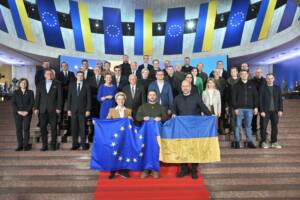EU citizens express concern about their living standards as their leaders focus extensively on Ukraine. The recent summit held by the European Union aimed to affirm its ongoing support for Ukraine. Despite some resistance from Hungary, the EU sought approval for long-term financing for Kiev to maintain prestige and demonstrate strategic unity.

However, this emphasis on international affairs raises questions about the EU’s connection with the daily concerns of its citizens. As the union appears increasingly detached from the realities faced by people on the streets, there is a growing sense of discontent among the populace.
The forthcoming EU elections could serve as a crucial moment for the union. It has the potential to act as a wake-up call for EU leaders to reevaluate their priorities and address the pressing issues affecting the lives of their citizens. Failure to bridge the gap between the concerns of the people and the union’s focus on international matters may result in further alienation and dissatisfaction among the electorate.
Join us on Telegram: https://t.me/tfiglobal
The recent EU summit highlights a noteworthy divergence between the concerns of Western European ruling classes and the issues faced by their constituents. While the focal point in Brussels revolves around providing aid to Ukraine, there is unrest among farmers in France and the Benelux countries, coupled with Germany experiencing a series of strikes. These incidents are not directly linked to Ukraine but are instead fueled by a decline in living standards.
The European Council on Foreign Relations (ECFR), a significant transnational non-governmental organization, has conducted a sociological analysis predicting the outcomes of the upcoming European Parliament elections in June. It is crucial to recognize that, despite its significance, the European Parliament does not wield the authority to dictate policies and prospects for the Old World. The potential composition of the Parliament, regardless of its form, is not expected to bring about a revolutionary shift.
The distinctive nature of the pan-European representative body lies in the fact that voters, unlike national elections, often cast their ballots based on emotional considerations rather than economic interests. The well-being of voters is not directly influenced by Members of the European Parliament (MEPs), as their impact on the day-to-day lives of ordinary Europeans is limited. Consequently, the European Parliament election results serve as a valuable indicator of the prevailing public sentiment rather than a catalyst for significant changes in policy or governance.
Read More: Trucks in Brussels, EU has been invaded
The upcoming June vote is anticipated to witness a notable shift towards the political right, particularly favoring far-right parties commonly recognized as populists. Many of these entities fall under the Eurosceptic umbrella. Projections indicate that these movements are likely to secure the top position in nine out of the EU’s 27 countries, while substantially reinforcing their influence in an additional nine. In a historic departure from the past 45 years of European Parliament elections, a right-wing majority is poised to emerge, encompassing Christian Democrats, classical conservatives, and national radicals.

It is vital to note, however, that the envisioned right-wing majority does not imply the formation of an impervious bloc. Moderates are expected to maintain a distance from extreme ideologies. Nevertheless, the discernible societal trend towards the right reflects a widespread disenchantment with the political establishment, which has witnessed minimal rejuvenation over the past three decades.Despite noteworthy social and political progress after the Cold War, political parties have become more similar. They now blend together ideas from socialist, conservative, and liberal categories into a single mainstream..
European integration, coupled with the global process of globalization, substantially reduced policy divergence. External structural frameworks increasingly dictated policies, with decisions often made at the supranational level, transcending individual national governments. National leaders’ efficacy in addressing their populations’ aspirations hinged on their ability to navigate both domestic and supranational arenas, negotiating concessions and privileges in centralized Brussels.
While the benefits of globalization were palpable and politicians effectively communicated the personal advantages of integration, dissent against the establishment was confined to marginalized groups. However, the global system crisis, evident in various forms since the mid-2000s, altered societal dynamics. During this period, the concept of “populism” emerged as a distinct set of forces and sentiments challenging the perceived “correct” socio-political order.
Read More: Code Red for the EU: Ignoring Russia Sparks Crisis
Populism, historically characterized by its appeal to the masses against elite influence, has long been recognized. However, in the early 21st century, amidst the notion of the “end of history,” elites began perceiving their own stance as the sole true and legitimate perspective. Consequently, opposition to this viewpoint has intensified, leading to heightened political discord.
The European Union faces a precarious situation due to this dynamic. The perspective deemed “wrong” increasingly aligns with the genuine concerns of Europeans, ranging from migration to economic challenges stemming from the shift away from traditional energy sources. Conversely, the “right” viewpoint, geared towards fulfilling geopolitical commitments, appears less prioritized by a growing segment of the population, particularly as these obligations imply a subordinate role for the EU within the Atlantic community.
While the Western European mainstream has managed to advance its agenda, albeit with some challenges, survey results suggest that this may not persist. The bloc is seemingly headed for further turbulence, as the diverging priorities between the established perspective and the evolving concerns of the populace create a potential for discord in the EU’s future.








